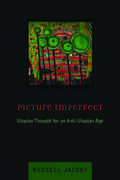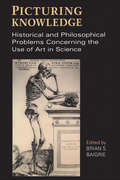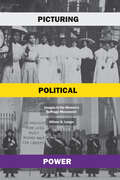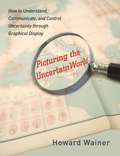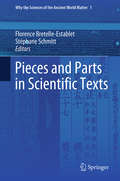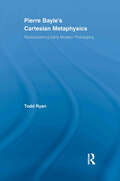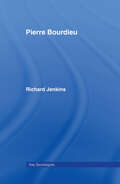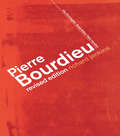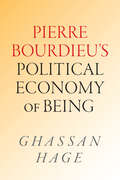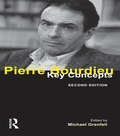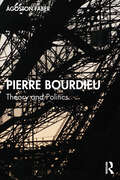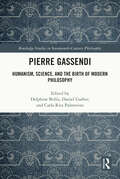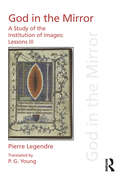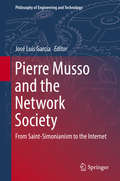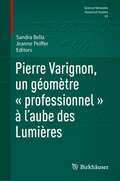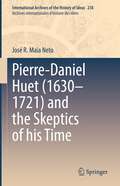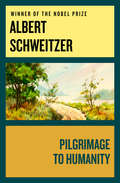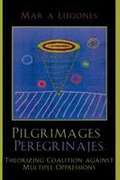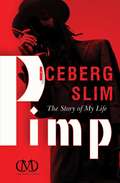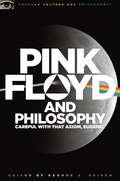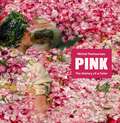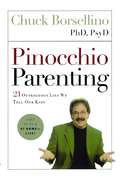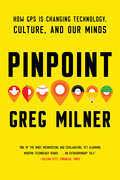- Table View
- List View
Pico della Mirandola
by Massimo Riva Francesco Borghesi Michael Papio Francesco Borghesi Michael PapioThis is a new translation of and commentary on Pico della Mirandola's most famous work, the Oration on the Dignity of Man. It is the first English edition to provide readers with substantial notes on the text, essays that address the work's historical, philosophical and theological context, and a survey of its reception. Often called the 'Manifesto of the Renaissance', this brief but complex text was originally composed in 1486 as the inaugural speech for an assembly of intellectuals, which could have produced one of the most exhaustive metaphysical, theological and psychological debates in history, had Pope Innocent VIII not forbidden it. This edition of the Oration reflects the spirit of the original text in bringing together experts in different fields. Not unlike the debate Pico optimistically anticipated, the resulting work is superior to the sum of its parts.
Picture Imperfect: Utopian Thought for an Anti-Utopian Age
by Russell JacobyPicture Imperfect Utopianism suffers from an image problem: A recent exhibition on utopias in Paris and New York included photographs of Hitler's Mein Kampf and a Nazi concentration camp. Many observers judge utopians and their sympathizers as foolhardy dreamers at best and murderous totalitarians at worst. However, as noted social critic and historian Russell Jacoby argues in this salient, polemical, and innovative work, not only has utopianism been unfairly characterized, a return to an iconoclastic utopian spirit is vital for today's society. Shaped by the works of Theodor Adorno, Walter Benjamin, Ernst Bloch, Gustav Landauer, and other predominantly Jewish thinkers, iconoclastic utopianism revives society's dormant political imagination and offers hope for a better future. Writing against the grain of history, Jacoby reexamines the anti-utopian mindset and identifies how utopian thought came to be regarded with such suspicion. He challenges standard readings of such anti-utopian classics as 1984 and Brave New World and offers stinging critiques of the influential liberal and anti-utopian theorists Hannah Arendt, Isaiah Berlin, and Karl Popper. He argues that these thinkers mistakenly equate utopianism with totalitarianism.The reputation of utopian thought has also suffered from the failures of, what Jacoby terms, the blueprint utopian tradition and its oppressive emphasis on detailing all aspects of society and providing fantastic images of the future. In contrast, the iconoclastic utopians, like those who follow God's prohibition against graven images, resist both the blueprinters' obsession with detail and the modern seduction of images. Jacoby suggests that by learning from the hopeful spirit of iconoclastic utopians and their willingness to accept new possibilities for society, we open ourselves to new and more imaginative ideas of the future.
Picturing Knowledge: Historical and Philosophical Problems Concerning the Use of Art in Science
by Brian BaigrieThe traditional concept of scientific knowledge places a premium on thinking, not visualizing. Scientific illustrations are still generally regarded as devices that serve as heuristic aids when reasoning breaks down. When scientific illustration is not used in this disparaging sense as a linguistic aid, it is most often employed as a metaphor with no special visual content. What distinguishes pictorial devices as resources for doing science, and the special problems that are raised by the mere presence of visual elements in scientific treatises, tends to be overlooked.The contributors to this volume examine the historical and philosophical issues concerning the role that scientific illustration plays in the creation of scientific knowledge. They regard both text and picture as resources that scientists employ in their practical activities, their value as scientific resources deriving from their ability to convey information.
Picturing Political Power: Images in the Women’s Suffrage Movement
by Allison K. LangeFor as long as women have battled for equitable political representation in America, those battles have been defined by images—whether illustrations, engravings, photographs, or colorful chromolithograph posters. Some of these pictures have been flattering, many have been condescending, and others downright incendiary. They have drawn upon prevailing cultural ideas of women’s perceived roles and abilities and often have been circulated with pointedly political objectives. Picturing Political Power offers perhaps the most comprehensive analysis yet of the connection between images, gender, and power. In this examination of the fights that led to the ratification of the Nineteenth Amendment in 1920, Allison K. Lange explores how suffragists pioneered one of the first extensive visual campaigns in modern American history. She shows how pictures, from early engravings and photographs to colorful posters, proved central to suffragists’ efforts to change expectations for women, fighting back against the accepted norms of their times. In seeking to transform notions of womanhood and win the right to vote, white suffragists emphasized the compatibility of voting and motherhood, while Sojourner Truth and other leading suffragists of color employed pictures to secure respect and authority. Picturing Political Power demonstrates the centrality of visual politics to American women’s campaigns throughout the nineteenth and early twentieth centuries, revealing the power of images to change history.
Picturing the Uncertain World: How to Understand, Communicate, and Control Uncertainty through Graphical Display
by Howard WainerIn his entertaining and informative book Graphic Discovery, Howard Wainer unlocked the power of graphical display to make complex problems clear. Now he's back with Picturing the Uncertain World, a book that explores how graphs can serve as maps to guide us when the information we have is ambiguous or incomplete. Using a visually diverse sampling of graphical display, from heartrending autobiographical displays of genocide in the Kovno ghetto to the "Pie Chart of Mystery" in a New Yorker cartoon, Wainer illustrates the many ways graphs can be used--and misused--as we try to make sense of an uncertain world.Picturing the Uncertain World takes readers on an extraordinary graphical adventure, revealing how the visual communication of data offers answers to vexing questions yet also highlights the measure of uncertainty in almost everything we do. Are cancer rates higher or lower in rural communities? How can you know how much money to sock away for retirement when you don't know when you'll die? And where exactly did nineteenth-century novelists get their ideas? These are some of the fascinating questions Wainer invites readers to consider. Along the way he traces the origins and development of graphical display, from William Playfair, who pioneered the use of graphs in the eighteenth century, to instances today where the public has been misled through poorly designed graphs. We live in a world full of uncertainty, yet it is within our grasp to take its measure. Read Picturing the Uncertain World and learn how.
Pieces and Parts in Scientific Texts (Why the Sciences of the Ancient World Matter #1)
by Florence Bretelle-Establet Stéphane SchmittThis book starts from a first general observation: there are very diverse ways to frame and convey scientific knowledge in texts. It then analyzes texts on mathematics, astronomy, medicine and life sciences, produced in various parts of the globe and in different time periods, and examines the reasons behind the segmentation of texts and the consequences of such textual divisions. How can historians and philosophers of science approach this diversity, and what is at stake in dealing with it? The book addresses these questions, adopting a specific approach to do so. In order to shed light on the diversity of organizational patterns and rhetorical strategies in scientific texts, and to question the rationale behind the choices made to present such texts in one particular way, it focuses on the issue of text segmentation, offering answers to questions such as: What was the meaning of segmenting texts into paragraphs, chapters, sections and clusters? Was segmentation used to delimit self-contained units, or to mark breaks in the physical appearance of a text in order to aid reading and memorizing, or to cope with the constraints of the material supports? How, in these different settings and in different texts, were pieces and parts made visible?
Pierre Bayle's Cartesian Metaphysics: Rediscovering Early Modern Philosophy (Routledge Studies in Seventeenth-Century Philosophy)
by Todd RyanIn his magnum opus, the Historical and Critical Dictionary, Pierre Bayle offered a series of brilliant criticisms of the major philosophical and theological systems of the 17th Century. Although officially skeptical concerning the attempt to provide a definitive account of the truths of metaphysics, there is reason to see Bayle as a reluctant skeptic. In particular, Todd Ryan contends that Bayle harbored deep sympathy for the attempt by Descartes and his most innovative successor, Nicolas Malebranche, to establish a metaphysical system that would provide a foundation for the new mechanistic natural philosophy while helping to secure the fundamental tenets of rational theology. Through a careful analysis of Bayle’s critical engagement with such philosophers as Spinoza, Leibniz, Locke and Newton, it is argued that, despite his reputation as a skeptic, Bayle was not without philosophical commitments of his own. Drawing on the full range of Bayle’s writings, from his early philosophical lectures to his final controversial writings, Ryan offers detailed studies of Bayle’s treatment of such pivotal issues as mind-body dualism, causation and God’s relation to the world.
Pierre Bourdieu (Key Sociologists)
by Richard JenkinsThis short critical introduction to Pierre Bourdieu's thought is a model of clarity and insight. Where Bourdieu's own writings are often complex, even ambiguous, Richard Jenkins is direct, concise and to the point. He emphasizes Bourdieu's contributions to theory and methodology while also dealing in detail with his substantive studies of education, social stratification and culture. His book provides the best short English-language introduction to Bourdieu's work.'As Jenkins points out in the final pages of his book, criticism can be the sincerest form of flattery. I particularly relished his critical approach to the work of Bourdieu and believe that he has written a timely introduction which both undergraduates and experienced teachers will find stimulating and enjoyable.'- Mike Hepworth, University of Aberdeen
Pierre Bourdieu (Key Sociologists)
by Richard JenkinsThis short critical introduction to Pierre Bourdieu's thought is a model of clarity and insight. Where Bourdieu's own writings are often complex, even ambiguous, Richard Jenkins is direct, concise and to the point. He emphasizes Bourdieu's contributions to theory and methodology while also dealing in detail with his substantive studies of education, social stratification and culture. His book provides the best short English-language introduction to Bourdieu's work.'As Jenkins points out in the final pages of his book, criticism can be the sincerest form of flattery. I particularly relished his critical approach to the work of Bourdieu and believe that he has written a timely introduction which both undergraduates and experienced teachers will find stimulating and enjoyable.'- Mike Hepworth, University of Aberdeen
Pierre Bourdieu's Political Economy of Being
by Ghassan HageIn Pierre Bourdieu’s Political Economy of Being, Ghassan Hage explores the great French social theorist’s work and revitalizes conventional and undertheorized aspects of his thinking. Hage focuses on Bourdieu’s concern with social being and what constitutes a worthwhile and fulfilling life. Such a life is not something that one either has or does not have; rather, society distributes and assigns values to ways of living. These values are structured by relations of power and domination and are subject to the outcome of political conflicts. Hage elucidates this political economy of being by reworking Bourdieu’s key concepts of habitus, illusio, symbolic capital, and field. In this political economy, people enjoy a worthwhile life to the degree that they are able to orient and deploy themselves practically in the world that surrounds them, have a sense of purpose, and achieve a level of social recognition. For Hage, the project of theorizing and understanding how people struggle to define, legitimize, and live a viable life in the face of symbolic domination permeates all of Bourdieu’s work.
Pierre Bourdieu: Key Concepts (Key Concepts)
by Michael GrenfellThe French social philosopher Pierre Bourdieu is now recognised as one of the major thinkers of the twentieth century. In a career of over fifty years, Bourdieu studied a wide range of topics: education, culture, art, politics, economics, literature, law, and philosophy. Throughout these studies, Bourdieu developed a highly specialised series of concepts that he referred to as his "thinking tools", which were used to uncover the workings of contemporary society. Pierre Bourdieu: Key Concepts highlights his most important concepts and examines them in detail. Each chapter deals with an individual concept and is written to be of immediate use to the student with little or no previous knowledge of Bourdieu. This new edition of the leading text is entirely revised and updated and includes new essays on Methodology, Politics and Social Space.
Pierre Bourdieu: Theory and Politics
by Ágoston FáberPierre Bourdieu is one of the most prominent figures in 20th-century sociology. His influence remains substantial even after his death in 2002, and his views and findings continue to divide sociologists to this day.This book examines the issue of Bourdieu’s so-called “political turn,” a significant topic in the French press and academic world. It explores whether the relationship between Pierre Bourdieu's increasingly visible political engagement from the mid-1990s and his earlier scientific work should be understood in terms of continuity or discontinuity.To investigate this specific issue, it is essential to discuss some basic concepts and significant insights of Bourdieu's social theory. The book also considers the robustness of Bourdieu’s theoretical framework and his criticisms of neoliberal capitalism from the perspective of Luc Boltanski’s competing pragmatic sociology.The book concludes that although Bourdieu, as a devoted left-wing intellectual, saw the possibility of resisting the neoliberal world order through mass mobilisation, inciting masses to collective action remains problematic within his sociological and anthropological framework. Through a systematic discussion of Bourdieu’s theory, the book offers insights into the relationship between science and politics and hopes to provide an opportunity for a deeper understanding of his work.
Pierre Gassendi: Humanism, Science, and the Birth of Modern Philosophy (Routledge Studies in Seventeenth-Century Philosophy)
by Daniel Garber Delphine Bellis Carla Rita PalmerinoPierre Gassendi (1592–1655) was a major figure in seventeenth-century philosophy and science and his works contributed to shaping Western intellectual identity. Among “new philosophers,” he was considered Descartes’s main rival, and he belonged to the first rank of those attempting to carve out an alternative to Aristotelian philosophy. In his writings, he promoted a revival of atomism and Epicureanism within a Christian framework, and advocated an empiricist and probabilistic epistemology which was to have a major impact on later thinkers such as Locke and Newton. He is moreover important for his astronomical work, for his defense of Galileo’s mechanics and cosmology, and for his activity as a biographer. Given the importance of Gassendi for the history of science and philosophy, it is surprising to see that he has been largely ignored in the Anglophone world. This collection of essays constitutes the first book on Gassendi in the English language that covers his biography, bibliography, and all aspects of his work. The book is divided into three parts. Part I offers a reconstruction of the genesis of Gassendi’s Epicurean project, an overview of his biography, and analyses of Gassendi’s early attacks on Aristotle, of his advocacy of Epicurean philosophy, and his relation to the skeptical tradition and to Cicero’s thought. Part II addresses Gassendi as a participant in seventeenth-century philosophical and scientific debates, focusing especially on his controversies with Descartes and Fludd. Part III explores Gassendi’s contributions to logic, theories of space and time, mechanics, astronomy, cosmology, and the study of living beings, and presents the reception of Gassendi’s thought in England. This book is an essential resource for scholars and upper-level students of early modern philosophy, intellectual history, and the history of science who want to get acquainted with Pierre Gassendi as a major philosopher and intellectual figure of the early modern period.
Pierre Legendre Lessons III God in the Mirror: A Study of the Institution of Images (Discourses Of Law Ser.)
by Pierre LegendreIn the context of our increasingly global legal order, Pierre Legendre’s God in the Mirror reconsiders the place of law within the division of existing bodies of knowledge. Navigating the texts of Ovid, Augustine, Roman jurists, medieval canon lawyers, Freud, Lacan, the notebooks of Leonardo de Vinci, and the paintings of Magritte, this third volume of Pierre Legendre’s Lessons focuses on the relation of the subject to the institution of images. Legendre tracks the origins and vicissitudes of the specular metaphor within western history, carrying out a critique of its dependence on the discourse of the Imago Dei. A crucial landmark within Legendre’s ongoing reconsideration of a medieval ‘revolution of interpretation’, this book dissociates the western normative tradition from its mythic foundation, separating theology and law. It thereby documents the advent of modern rational doubt, as a new legal foundation or ground: one that, for Legendre, was not only a revolutionary invention, but one that produced the modern European idea of the State.
Pierre Musso and the Network Society
by José Luís GarciaThis book is devoted to discussion of the views of Pierre Musso and starts with a central chapter written by Musso, entitled Network Ideology: from Saint-Simonianism to the Internet . Pierre Musso is a French philosopher and is one of the most original thinkers in the history of the network society. His thought develops a critique of information and communication technologies through their imaginary and social representations and of the information society, based on the network metaphor.The main question on which Musso has focused his attention is how the network metaphor is one of the most powerful ways of understanding the complex societies in which we live. Showing characteristic attention to detail, and drawing on the history of ideas, political philosophy and sociology, Musso traces the genealogy of the network imaginary, and points out that it did not emerge with the Internet. He shows how its modern roots can be found in Henri de Saint-Simon and his disciples, engineers and entrepreneurs such as Michel de Chevalier, and Barthélemy Prosper Enfantin, who developed channel networks, railroads, and the telegraphic network in France in the nineteenth century. In addition to the central piece written by Musso, the book includes a general introduction and six commentaries from experts on information technologies and networks. It displays a wide range of perspectives from a diverse set of authors in terms of nationalities and universities, as well as disciplinary backgrounds.
Pierre Varignon, un géomètre « professionnel » à l’aube des Lumières (Science Networks. Historical Studies #65)
by Jeanne Peiffer Sandra BellaL’objectif de cet ouvrage, issu d’un colloque et d’une exposition à la bibliothèque Mazarine organisés à l’occasion du tricentenaire du décès de Pierre Varignon (1654-1722), est de retracer la trajectoire de ce mathématicien dans son contexte historique, et de faire le point sur les recherches menées sur lui ces dernières décennies. Même si Varignon ne fait pas partie du panthéon des mathématiciens, c’est un savant « normal », ni génial ni méconnu, et c’est en cela qu’il mérite d’être étudié. Géomètre et mécanicien reconnu par ses contemporains, membre puissant de l’Académie royale des sciences, en contact épistolaire avec Leibniz, Newton ou encore les frères Bernoulli, Varignon fut aussi le premier titulaire de la première chaire de mathématiques du collège Mazarin et professeur au Collège royal. Ses travaux situés à une époque de transition sont marqués par le cartésianisme mais contribuent aussi à l’introduction de l’analyse leibnizienne en France et à la naissance de la mécanique analytique. Cette collection d'essais sera précieuse pour les étudiant(e)s et les chercheur(e)s intéressé(e)s par l'héritage de Varignon et le contexte historique des sciences aux XVIIe et XVIIIe siècles. *** This book originates from a symposium and an exhibition at the Mazarine Library in Paris organized to commemorate the trecentenary of Pierre Varignon's death (1654-1722), and it aims to retrace the trajectory of this notable mathematician within his historical context, as well as to take stock of the research carried out on him in recent decades. A respected geometer and "mechanic" of his time, he was a prominent member of the Paris Académie royale des sciences, and part of an extended international network including Leibniz, Newton and the Bernoullis. He held the first chair of mathematics, established at the Collège Mazarin, and was a professor at the Collège Royal. This collection of essays will be invaluable to students and scholars interested in Varignon’s legacy and the historical context of science in the 17th and 18th centuries.
Pierre-Daniel Huet (International Archives of the History of Ideas Archives internationales d'histoire des idées #238)
by José R. Maia NetoThis book offers a detailed and scholarly historical and philosophical examination of French scepticism from Descartes to the beginning of the Enlightenment by examining the views of Pierre-Daniel Huet (1630–1721). It shows the crucial role played by Huet in the modification of the early modern sceptical tradition: from a practical perspective closer to ancient scepticism, mostly presented by Montaigne and Charron, to an epistemological and metaphysical perspective strongly influenced by Descartes’s doubt. The book examines and gives original interpretations of the various sceptical (and semi-sceptical) views held in the period and their connections to Huet’s own scepticism. Besides known philosophers such as Descartes, Gassendi, Pascal and Bayle, the book also accesses sceptical views held by secondary figures such as La Mothe Le Vayer and Simon Foucher and others who have not thus far been connected to the sceptical tradition such as Jean-Baptiste du Hamel and Madeleine de Scudéry. The book is useful for scholars in the field of early modern ideas: philosophical, religious and scientific.
Pilgrimage to Humanity
by Albert SchweitzerThe dimensions of the central theme are illuminated by Schweitzer&’s discussions of his philosophy of culture, the course of his life, his ministry to human needs in Africa, the idea of reverence for life, the ideal of world peace, the significance of liberal Christianity, and the lives, world-views, and contributions of Johann Goethe, J. S. Bach, and Jesus of Nazareth. The pages of these selections give a remarkable revelation of the creative spirit of a modern saint and philosopher. The translation is by Water E. Stuermann, University of Tulsa.
Pilgrimage to Humanity: The Essence Of Faith, Pilgrimage To Humanity, The Quest Of The Historical Jesus, And The Light Within Us (Paperback Ser.)
by Albert SchweitzerThe dimensions of the central theme are illuminated by Schweitzer&’s discussions of his philosophy of culture, the course of his life, his ministry to human needs in Africa, the idea of reverence for life, the ideal of world peace, the significance of liberal Christianity, and the lives, world-views, and contributions of Johann Goethe, J. S. Bach, and Jesus of Nazareth. The pages of these selections give a remarkable revelation of the creative spirit of a modern saint and philosopher. The translation is by Water E. Stuermann, University of Tulsa.
Pilgrimages/Peregrinajes: Theorizing Coalition Against Multiple Oppressions (Feminist Constructions Series)
by María LugonesThe author has collected some of her most famous essays, as well as some lesser-known gems, in this book. She writes from her own perspective as an inhabitant of a number of different 'worlds.' Born in Argentina but living for a number of years in the United States, she sees herself as neither quite a U.S. citizen, nor quite an Argentine. An activist against the oppression of Latino/a people by the dominant U.S. culture, she is also an academic participating in the privileges of that culture. A lesbian, she experiences homophobia in both Anglo and Latino world. A woman, she moves uneasily in the world of patriarchy. She writes out of multiple and conflicting subjectivities that shape her sense of who she is, resisting the demand for a unified self in light of her necessary ambiguities. The book explores the possibility of deep coalition with other women of color, based on 'multiple understandings of oppressions and resistances'―understandings whose logic she subjects to philosophical investigation.
Pimp: The Story of My Life (Sapphire Presents Ser.)
by Iceberg SlimBefore Hip Hop, there was the pimp. The book that brought black literature to the streets is back to show the Hip Hop generation what it's all about, where they came from. By telling the story of one man's struggles and triumphs in an underground world, this book shows the game doesn't change - it just has a different swagger. Iceberg Slim's story is now depicted in a major motion picture distributed worldwide. Iceberg Slim: Portrait of a Pimp shows Slim's transformation from pimp to the author of 7 classic books.As real as you can get without jumping in, this is the story of Slim's life as he saw, felt, tasted, and smelled it. Only he could tell this story and make the reader feel it. If you thought Hustle & Flow was the true pimp story, this book is where it all began. This is the heyday of the pimp, the hard-won pride and glory, small though it may be; the beginnings of pimp before it was dragged in front of the camera, before pimp juice and pimp style. A trip through hell by one man who lived to tell the tale. The dangers of jail, addiction and death that are still all too familiar for today's black community. Though it is a tale of his times, it will remain current and true for as long as there is a race bias, as long as there is a street life, as long as there is exploitation.
Pink Floyd and Philosophy
by George A. ReischWith their early experiments in psychedelic rock music in the 1960s, and their epic recordings of the 1970s and '80s, Pink Floyd became one of the most influential and recognizable rock bands in history. As "The Pink Floyd Sound," the band created sound and light shows that defined psychedelia in England and inspired similar movements in the Jefferson Airplane's San Francisco and Andy Warhol's New York City. The band's subsequent recordings forged rock music's connections to orchestral music, literature, and philosophy. "Dark Side of the Moon" and "The Wall" ignored pop music's ordinary topics to focus on themes such as madness, existential despair, brutality, alienation, and socially induced psychosis. They also became some of the best-selling recordings of all time.In this collection of essays, sixteen scholars expert in various branches of philosophy set the controls for the heart of the sun to critically examine the themes, concepts, and problems-usually encountered in the pages of Heidegger, Foucault, Sartre, or Orwell-that animate and inspire Pink Floyd's music. These include the meaning of existence, the individual's place in society, the interactions of knowledge and power in education, the contradictions of art and commerce, and the blurry line-the tragic line, in the case of Floyd early member Syd Barrett (died in 2006)-between genius and madness. Having dominated pop music for nearly four decades, Pink Floyd's dynamic and controversial history additionally opens the way for these authors to explore controversies about intellectual property, the nature of authorship, and whether wholes-especially in the case of rock bands-are more than the sums of their parts.
Pink: The History of a Color (The History of a Color)
by Michel PastoureauFrom the acclaimed author of Blue and other color histories, the beautifully illustrated story of pink, from the first ancient pigments to BarbiePink has such powerful associations today that it&’s hard to imagine the color could ever have meant anything different. But it&’s only since the introduction of the Barbie doll in 1959 that pink has become decisively feminized. Indeed, in the eighteenth century, pink was frequently masculine, and the color has signified many things beyond gender over the course of its long history—from the prim to the vulgar, and from the romantic to the eccentric. In this richly illustrated book, Michel Pastoureau, a celebrated authority on the history of colors, presents a fascinating visual, social, and cultural history of pink in the West, from antiquity to today.Pink pigments first appear in ancient Macedonian paintings, but it was not until the eighteenth century that vivid, saturated pinks were developed for dyeing and painting. At the same time, a popular new flower—the pink rose—finally gave the color a standard name, and pink, assuming a place in everyday life, began to acquire its own symbolism, distinct from that of red, yellow, or white. Bringing the story up to the twentieth and twenty-first centuries, Pink describes how the color, both adored and detested, became associated with many other things, from softness and pleasure to nudity and sex.Illustrated throughout with a wealth of captivating images, Pink is an entertaining and enlightening account of the evolving role and significance of the color in art, fashion, literature, religion, science, and everyday life across the millennia.
Pinocchio Parenting: 21 Outrageous Lies We Tell Our Kids
by Chuck BorsellinoAre you a Pinocchio Parent? You may be asking yourself these very questions: What lies, clichés, and half-truths do I tell my children? How do these lies hurt my children and my relationship with them? Clinical psychologist and author Chuck Borsellino claims that our culture condones all sorts of lies -- from "tiny fibs" to calloused misrepresentations. Though well-intentioned in our unintentional lies, we set our children up for failure and disappointment and undercut our credibility. In the pages of this book, Dr. Chuck Borsellino helps you sort out fact from fiction, intention from outcome. Most important, you'll learn a better way -- a way to help your children live life within the bounds of reality while fully exploring the dreams of their heart.
Pinpoint: How Gps Is Changing Technology, Culture, And Our Minds
by Greg MilnerPinpoint tells the story of GPS, a scientific marvel that enables almost all modern technology--but is changing us in profound ways. Over the last fifty years, humanity has developed an extraordinary shared utility: the Global Positioning System. Even as it guides us across town, GPS helps land planes, route mobile calls, anticipate earthquakes, predict weather, locate oil deposits, measure neutrinos, grow our food, and regulate global finance. It is as ubiquitous and essential as another Cold War technology, the Internet. In Pinpoint, Greg Milner takes us on a fascinating tour of a hidden system that touches almost every aspect of our modern life. While GPS has brought us breathtakingly accurate information about our planetary environment and physical space, it has also created new forms of human behavior. We have let it saturate the world's systems so completely and so quickly that we are just beginning to confront the possible consequences. A single GPS timing flaw, whether accidental or malicious, could bring down the electrical grid, hijack drones, or halt the world financial system. The use, and potential misuse, of GPS data by government and corporations raise disturbing questions about ethics and privacy. GPS may be altering the nature of human cognition--possibly even rearranging the gray matter in our heads. Pinpoint tells the sweeping story of GPS from its conceptual origins as a bomb guidance system to its presence in almost everything we do. Milner examines the different ways humans have understood physical space, delves into the neuroscience of cognitive maps, and questions GPS's double-edged effect on our culture. A fascinating and original story of the scientific urge toward precision, Pinpoint offers startling insight into how humans understand their place in the world.

